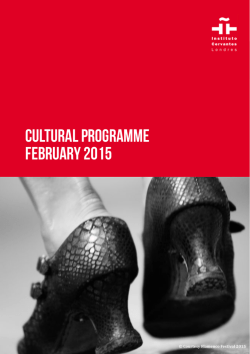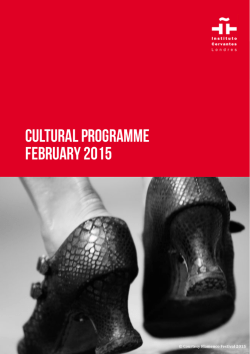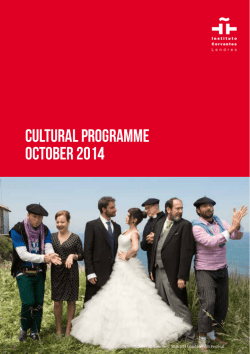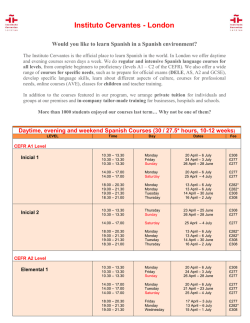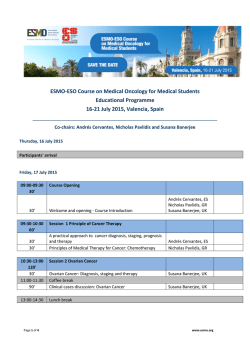
cultural programme NOVember 2014 - Instituto Cervantes in London
cultural programme NOVember 2014 THEATRE DRAMATISED READING Olvida Los Tambores By Ana Diosdado. A Spanish Theatre Company production SUN 2, 6:00pm In Spanish With the collaboration of the Office of Cultural and Scientific Affairs, Embassy of Spain in the UK, Instituto Cervantes London and El Ibérico Southwark Playhouse, 77-85 Newington Causeway, London SE1 6BD Tickets £10 Further information: http://southwarkplayhouse.co.uk/events/olvida-los-tambores// © Courtesy Spanish Theatre Company 2014 Olvida los Tambores tells the story of Alicia and Tony, a young couple who live their life in a free way, without making any concessions to routine. Tony has formed a music group with his friend Pepe , and they are fighting to become a success. One day in Alicia’s apartment her older sister, Pili, appears. She has just split from her husband, because she is tired of the everyday tedium of marriage. Lorenzo, Pili’s husband, then turns up in search of his wife hoping to save their relationship. On the same day, Tony and Pepe have a dinner with Nacho, an important music producer who is interested in the group of friends and who seems to be giving them the opportunity they are looking for. CULTURE AND tourism CASTILLA Y LEON CELEBRATES THE V CENTENARY OF Saint TERESA OF AVILA By Alberto Bosque Coello TUE 4, 6:30pm In English Organised by the Fundación Siglo para el Turismo y las Artes de Castilla y León and Ministerio de Cultura de Castilla y León With the collaboration of the Spanish Tourist Office and Instituto Cervantes London Auditorium Instituto Cervantes London Admission free Booking essential: [email protected] | 02072010752 Further information www.londres.cervantes.es A celebration of Castilla y Leon as a destination for culture, gastronomy and nature. Discover this fascinating region in the heart of Spain: Its artistic, historical, natural and culinary wealth. It is a must for 2015 with many events organised to celebrate the 5th centenary of the birth of Saint Teresa, an important figure in religion, history and literature. Following the presentation there will be a tasting of local products, D.O. wines (Ribera del Duero and Rueda) and the famous sweets by the Carmelite nuns. sociology BOOK LAUNCH HISPANOMANIA By Tom Burns Marañón THU 6, 6:30pm In English In collaboration with the BritishSpanish Society Auditorium Instituto Cervantes London Tickets £7. £5 for BritishSpanish Society members. Free for members of the Instituto Cervantes London Booking: [email protected] | 02072010752 Further information: http://www.britishspanishsociety.org/event/ presentacion-del-libro-hispanomania-de-tom-burns-maranon/#sthash.7izN4P9n.dpuf Anglo-Spanish journalist award winning journalist Tom Burns Marañón will be discussing his insightful and entertaining book Hispanomanía. In a literary tour de force Hispanomania follows in the footsteps of some of the great British, US, and French authors who have travelled and written on Spain, from Borrow, Ford, and Gautier to Brennan, Orwell, and Hemingway. The author’s provocative thesis is that these literary travellers have constructed a series of stereotypes of what Spain is and what it is to be a Spaniard, contributing to the myth that Spain is different. Burns (older brother of the chairman of the BritishSpanish Society) shows how the typecasts fed off each other and how their romantic images shaped what Spaniards thought about themselves. Hispanomania (new updated edition published by Galaxia Gutemberg) questions the view that Spain was exaggeratedly “different” from other southern European countries and asks how far the “exceptionalism” narrative has undermined an objective understanding of España. Tom Burns Marañón OBE, was educated at Stonyhurst College & Oxford University where he studied under Professor Raymond Carr. He has reported on Spain for a series of leading global publications including Newsweek, Washington Post, and the Financial Times. He is currently a leading Spanish media columnist. His books have covered a range of Spanish cultural and political subjects including the Transition and the Monarchy. CONTEMPORARY DANCE FESTIVAL CURRENCY: #1. Mañana es mañana By Cridacompany SAT 8, 7:30pm #2. El Pliegue By Sonia Sánchez WED 12, 6:30pm The Place, 17 Duke’s Rd, London WC1H 9PY Further information: http://www.theplace.org.uk/currency-2014 © Courtesy The Place 2014 The Place and Crying Out Loud, in partnership with the European Commission and with the support of EUNIC, organise Currency, a festival of fresh-thinking from the edges of European performance. In its 2014 edition, Currency presents two shows created by Spanish artists: ‘Mañana es mañana’ by Cridacompany, and ‘El Pliegue’ by Sonia Sánchez. The festival also includes a series of ‘blind dates’ between UK based artists and their peers from the festival and a pop-up interactive café, where food meets art. The Spanish dancer Sonia Sanchez pushes the limits of the traditional flamenco form with the aim of developing her own passionate dance language. She explores each fold and unfold as her body bends and stretches to sounds, silences, melodies, etc. LITERATURE LECTURE SERIES SPANISH AND LATIN AMERICAN LITERATURE NOBEL PRIZE WINNERS: MARIO VARGAS LLOSA, A NOBEL NOBLE? By Professor Philip Swanson, University of Sheffield Coordinated by Dr. Maria José Blanco, King’s College TUE 11, 6:30pm In English Co-organized by the Office of Cultural and Scientific Affairs, Embassy of Spain in the UK & Instituto Cervantes Londres With the collaboration of King’s College London Auditorium Free admission Booking essential [email protected] | 0207 201 0752 Mario Vargas Llosa (1936) is a Peruvian novelist, playwright, essayist, journalist, and literary critic born in Arequipa and who spent parts of his youth in Cochabamba (Bolivia), Piura in northern Peru and Lima. He attended the University of San Marcos for 2 years starting in 1955, where he studied literature and law. He published his first novel in 1962, La ciudad y los perros (The Time of the Hero). Other famous works include: La casa verde (1966) (The Green House), Conversación en la Catedral (1969) (Conversation in the Cathedral), Pantaleón y las visitadoras (1973) (Captain Pantoja and the Special Service), La tía Julia y el escribidor (1977) (Aunt Julia and the Scriptwriter), ¿Quién mató a Palomino Molero? (1986) (Who Killed Palomino Molero?) and La fiesta del chivo (2000) (The Feast of the Goat), amongst others. His books have been translated into more than forty languages. He has received a long list of prestigious literary awards, including the Leopoldo Alas Prize (1959), the Rómulo Gallegos Prize (1967), the National Critics’ Prize (1967), the Critics’ Annual Prize for Theatre (1981), the Prince of Asturias Prize (1986), the Miguel de Cervantes Prize (1994), the Jerusalem Prize (1995), the Peace Prize of the German Book Trade (1996), the PEN/Nabokov Award (2002), and many Doctor Honoris Causa degrees from the most prestigious universities. He received the Nobel Prize in literature in 2010. Philip Swanson is Hughes Professor of Spanish at the University of Sheffield, UK. He has published extensively on Latin American literature, including books on the New Novel, José Donoso, Gabriel García Márquez and other aspects of Latin American literature and culture. He has also published on North American representations of Latin America in film and fiction, and on the cinema of Spain. Professor Swanson is a member of various editorial boards and specialist professional advisory bodies, as well as former President of the Association of Hispanists of Great Britain and Ireland. He has taught in a number of universities in Europe and the USA. HISTORy The Rise and fall of the Spanish Empire #3: Recreation, Sport and the Long Demise of the Spanish Empire in the Americas By Dr. Matthew Brown, University of Bristol WED 12, 6:30pm In English Organised by Canning House and Instituto Cervantes London Auditorium Instituto Cervantes London Tickets £10 | Concessions £5 for members of Canning House and Instituto Cervantes London (code CERVANTESMEMBER) Bookings: www.canninghouse.org © Courtesy Canning House The third talk in the Canning House – Instituto Cervantes joint history series that chronicles ‘The Rise and Fall of the Spanish Empire’ looks at ‘Recreation, Sport and the Long Demise of the Spanish Empire in the Americas‘. The talk will be given by Dr Matthew Brown, University of Bristol. The lecture will address the questions of how new sports, games, recreations and pastimes came to be established in the Spanish– speaking Americas after Independence. To what extent was football seen as a manifestation of British informal empire, or baseball as an extension of U.S. neo-colonialism? Drawing on a range of cases from across the continent, based on new archival research conducted across South America, the lecture will assess the ongoing popularity of Spanish popular games, including bull fighting and cock fighting. It will conclude by assessing the extent to which Independence was a cultural as well as a political and military process. Dr Matthew Brown has a blog about Latin American Independence, with a particular focus on its international context, at http://bolivariantimes.blogspot.co.uk/. He is the co-editor (with Dr Gabriel Paquette of Johns Hopkins University) of the volume Connections after Colonialism: Europe and Latin America in the 1820s is out in January 2013 with the University of Alabama Press. He has published a biography of the men who fought at the Battle of El Santuario, 17 October 1829, has just come out with Palgrave Macmillan: The Struggle for Power in Post-Independence Colombia and Venezuela (2012). MuSIC the SPANISH AND LATIN AMERICAN MUSIC AT Instituto Cervantes London concert series TUE 21 OCT, TUE 18 NOV, 7:30pm Organised by Instituto Cervantes London In collaboration with ILAMS Auditorium Instituto Cervantes London Tickets: £12 (£10 in advanced); concessions: £6 members of Instituto Cervantes London, ILAMS, senior citizens, full-time students and ES40 holders (£5 in advanced) Booking: [email protected] | 0207 201 0752 Further information www.londres.cervantes.es The Instituto Cervantes London in collaboration with ILAMS has organised a series of concerts aimed at promoting Spanish and Latin American classical music and also to offer an auditorium to young musicians with very promising careers. These artists come from Spanish and Latinamerican backgrounds and they studied music in the UK. A unique opportunity to enjoy the diversity of the colour, vitality and exuberance that Iberian and Latin American music is famous for. Concert 1. By Manus Noble, guitar, He will play works by Piazzola, Brouwer, Dyens, Barrios, Yocoh, Ryan, Albéniz y Noble. Concert 2. A duet formed by Amaia Azcona Cildoz, soprano, and Adam Szymanski, guitar. The duo will performe works by Ponce, Rodrigo, Falla, LLobet, Gustavino y Villa-Lobos. Concert 3. By the Roncesvalles duet, With Francisco Javier Jaúregui (guitar) Elena Jáuregui (violín), and special guest Gúdrun Ólafsdóttir, mezzosoprano, They will performe Works by Jáuregui, García Lorca, Morales, Castilla-Ávila, del Puerto and Barber. MuSIC the SPANISH AND LATIN AMERICAN MUSIC AT Instituto Cervantes London concert series #3: The RONCESVALLES duet Elena Jáuregui, violin, and Francisco Javier Jáuregui, guitar Special guest Gúdrun Ólafsdóttir, mezzosoprano TUE 18, 7:30pm Organised by Instituto Cervantes London In collaboration with ILAMS Auditorium Instituto Cervantes London Tickets: £12 (£10 in advanced); concessions: £6 members of Instituto Cervantes London, ILAMS, senior citizens, full-time students and ES40 holders (£5 in advanced) Booking: [email protected] | 0207 201 0752 The Spanish violin/guitar Roncesvalles Duo (Elena and Francisco Javier Jáuregui) launch their new CD Secretos quiero descubrir. From the heritage of the Sephardic communities, passed down from generation to generation since medieval times, to songs by Lorca and the folk Basque tradition, to the UK premiere of new Spanish music, this colourful evening will draw you into the depths of the Spanish soul. With special guest, award-winning Icelandic mezzo-soprano, Gúdrun Ólafsdóttir. Programme: Francisco Javier Jáuregui, Secretos quero descubrir, Nani, nani and Yo m’enamorí d’un aire, from “Canciones sefardíes”. Federico García Lorca, El Café de Chinitas, Los cuatro muleros, Nana de Sevilla and Los reyes de la baraja, from “Canciones Españolas Antiguas”. Eduardo Morales Caso, Homenaje a Joaquín Rodrigo, Homenaje a Frederic Mompou and Homenaje a Manuel de Falla, from “Homenajes para voz y guitarra”. Agustín Castilla Ávila, Duerme Tesoro (Voice and guitar). David del Puerto, Prólogo (Voice and guitar). John Barber, Navarra Lullaby. Francisco Javier Jáuregui, Aurtxo txikia and Basatxoritxo, from “Tres canciones folclóricas vascas”. HISTORy The Rise and fall of the Spanish Empire #4: Did The Empire fall in Cuba or was it Pushed? And if so, by Whom? By Prof. Antoni Kapcia, University of Nottingham WED 26, 6:30pm In English Organised by Canning House and Instituto Cervantes London Auditorium Instituto Cervantes London Tickets £10 | Concessions £5 for members of Canning House and Instituto Cervantes London (code CERVANTESMEMBER) Bookings: www.canninghouse.org © Courtesy Canning House For some 80 years after the first waves of independence rebellions in Spanish America, Cuba defied the odds – and sporadic and often half-hearted US pressure – and remained decidedly under Madrid’s colonial control. However, this soon turned out to be much less because of any deep Cuban loyalty (although, as the century progressed, Spanish immigration into the island did cement cultural links and complicate the small but steadily growing constituency for separatism) or because of Spanish power than because of persistent creole fears of black rebellion. Slavery, therefore, remained the key to conditional loyalty; hence, when the abolition of the slave trade made slavery a declining asset and especially when Madrid, to head off the prospect of black support for independence, decreed the eventual abolition of slavery, the die was cast and all-out rebellion became only a matter of time. Nonetheless, it still took over two decades for that rebellion to come close to succeeding. Professor Antoni Kapcia, teaches at the University of Nottingham. He has done research and publications have long specialised on modern Cuba, specifically in two areas: Modern Cuban history: this has meant a special focus on political radicalism in the 1920s-50s and the roots of the post-1959 Revolution, and, on the Revolution’s ideology, radicalisation and cultural development and contemporary Cuban history and politics, focussing on participation, the Party, the political system and cultural politics. He just completed a jointly authored book, arising from a 4-year project, financed by the Leverhulme Trust, in collaboration with Dr Par Kumaraswami (University of Manchester), which examines literary culture in Cuba since 1959. In collaboration with
© Copyright 2026
